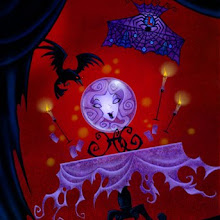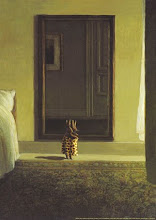
The three of them made small talk about Ricky Ford’s latest movie, and Dave recalled specific examples of stupid directors and producers with the undisguised contempt that a person can have for unpleasant things when he has escaped daily contact with them. But the nice thing about Dave Bridges was that nobody around him had to say anything at all. Not long after Evelyn slid off the couch, the only sounds in the living room were the snips of Dave’s scissors working, the fire crackling, and Ricky Ford occasionally clearing his throat. Dave had pulled one of the chairs away from the dining room table for him to sit in so that he faced a glass wall looking out over a rolling field of orange proteas. One of the long gray strands Dave cut from Ricky Ford’s head floated near Evelyn and she caught it in her hand. It made her a little sad, because this haircut meant the character would probably be laid to rest. She tried to read his thoughts from his expression, and she guessed that he wasn’t all that happy either, maybe because he knew with the hair gone he’d never have another chance to get it right. Dave trimmed the back so it was just long enough to cover the back of his neck and wouldn’t have to be shaved, the way he always wore his hair when he wasn’t doing a film, the way Evelyn liked it.
She stretched out on the carpet near Ricky Ford’s feet, looking up at his tired face. He was not looking at her, but he was colored by the orange reflection of the flowers outside. The professor had stood over her after the first time he knocked her to the floor, but he had not looked down at her either. She remembered his drawn face, above her and looking away, colored by an extraordinary sunset, monochromatic light coming through the loft’s paned windows on every side of her. Was it really that beautiful, she thought, or am I remembering the movie? She had wanted to stand and watch the sun, but when she tried to get up, his fist came down on her head hard enough for her to see two images of him, and she tried to fix her eyes on the one image that was slowly drifting away, splitting from his body like a cell in division, because she thought it was his soul departing.
After he kicked her a few more time, she figured out that it wasn’t his soul, that it was that other man, the man who made her say things that were worth writing down, who was abandoning her. Covered with blood from her nose, her mouth , her left ear, and a compound fracture to one of her hands, too weak this time to stand up, she had to smile for a minute at her epiphany, realizing for the first time that this man had lived in the bodies of all of her lovers until he had worn them out. In his haste to abandon her, he ran from the room like a coward, but she could always forgive him. The worst part of the beating was that she might not get back this man she really loved because he had been literally knocked out of her head, and she knew she wouldn’t be able to write without him. She wanted him back so badly that she made up a name to call him. She felt like she had to now that she had seen him so clearly just as he was heading for the door. Bobby was the name she came up with, a name she didn’t even particularly like, but it was the right name for the man who made her say things, and she screamed it at the top of her lungs for hours to the empty loft.
Damn you, Bobby, she thought now, pulling at Dave Bridges’ carpet, don’t leave again. Not now, when I really need you. But she knew it was too late. She looked up at Ricky Ford again. There was an emptiness behind his eyes that told her she could stop expecting to hear Bobby’s voice when she buried her face in his neck. Bobby’s gone and he’s not coming back, she thought. Forget him. He is still as undeserving of my faith as he was the first time he told me what to write when I was eighteen years old.
Now Evelyn is sitting on Makena Beach, watching the tip of Ricky Ford’s snorkel in the shallow waves. They have this arrangement, since she is a weak swimmer, that he checks out the fish and reports back to her. Today the water is clear and the show is like being inside an aquarium, he says. She considers the prospect of the spectacle and is no longer surprised that inside her head is not poetry but utter silence.
He lies back on the towel exhausted from his swim, and she is sure to twist on her elbow so that her head and shoulders shade his eyes from the sun. Look, Ev, he says, are you sure you’re all right? How are you doing, really, since your mom? And she says, Hey listen, why don’t you let me take care of you for a while? I’m not writing, I don’t have anything to do, so let me worry about you for a change. He reflects, he whispers, I think I’d like that, I’d like that very much. You still don’t get it, she thinks about telling him. I never wrote a thing, I never controlled it. But she keeps it to herself. She has given up trying to recall the sound of Bobby’s voice. For the moment, she feels she has been set free.
But Evelyn is going to get home and find a packet of photographs some relative has mailed her from her dead mother’s house. A number of them are of her father, Ed Johnson, who died when she was fifteen, but the most important one is the picture of him from the war, handsome American Soldier on German soil. In it he is down on one knee, holding a small black and white dog by the front paws, and this is significant because she remembers that he didn’t like dogs very much. He didn’t like the war very much either, but in this photograph he is so healthy and happy, he could be another man entirely, could deny the dog and the whole damn thing had he not written on the back in his unmistakable hand, “Me and Butch, 1943.”
She is going to look at that picture for a long time, and then she is going to scream, “Damn it, Bobby, goddamn you to hell. You are me making say things, but now I have no desire to write them down.”
THE END
She stretched out on the carpet near Ricky Ford’s feet, looking up at his tired face. He was not looking at her, but he was colored by the orange reflection of the flowers outside. The professor had stood over her after the first time he knocked her to the floor, but he had not looked down at her either. She remembered his drawn face, above her and looking away, colored by an extraordinary sunset, monochromatic light coming through the loft’s paned windows on every side of her. Was it really that beautiful, she thought, or am I remembering the movie? She had wanted to stand and watch the sun, but when she tried to get up, his fist came down on her head hard enough for her to see two images of him, and she tried to fix her eyes on the one image that was slowly drifting away, splitting from his body like a cell in division, because she thought it was his soul departing.
After he kicked her a few more time, she figured out that it wasn’t his soul, that it was that other man, the man who made her say things that were worth writing down, who was abandoning her. Covered with blood from her nose, her mouth , her left ear, and a compound fracture to one of her hands, too weak this time to stand up, she had to smile for a minute at her epiphany, realizing for the first time that this man had lived in the bodies of all of her lovers until he had worn them out. In his haste to abandon her, he ran from the room like a coward, but she could always forgive him. The worst part of the beating was that she might not get back this man she really loved because he had been literally knocked out of her head, and she knew she wouldn’t be able to write without him. She wanted him back so badly that she made up a name to call him. She felt like she had to now that she had seen him so clearly just as he was heading for the door. Bobby was the name she came up with, a name she didn’t even particularly like, but it was the right name for the man who made her say things, and she screamed it at the top of her lungs for hours to the empty loft.
Damn you, Bobby, she thought now, pulling at Dave Bridges’ carpet, don’t leave again. Not now, when I really need you. But she knew it was too late. She looked up at Ricky Ford again. There was an emptiness behind his eyes that told her she could stop expecting to hear Bobby’s voice when she buried her face in his neck. Bobby’s gone and he’s not coming back, she thought. Forget him. He is still as undeserving of my faith as he was the first time he told me what to write when I was eighteen years old.
Now Evelyn is sitting on Makena Beach, watching the tip of Ricky Ford’s snorkel in the shallow waves. They have this arrangement, since she is a weak swimmer, that he checks out the fish and reports back to her. Today the water is clear and the show is like being inside an aquarium, he says. She considers the prospect of the spectacle and is no longer surprised that inside her head is not poetry but utter silence.
He lies back on the towel exhausted from his swim, and she is sure to twist on her elbow so that her head and shoulders shade his eyes from the sun. Look, Ev, he says, are you sure you’re all right? How are you doing, really, since your mom? And she says, Hey listen, why don’t you let me take care of you for a while? I’m not writing, I don’t have anything to do, so let me worry about you for a change. He reflects, he whispers, I think I’d like that, I’d like that very much. You still don’t get it, she thinks about telling him. I never wrote a thing, I never controlled it. But she keeps it to herself. She has given up trying to recall the sound of Bobby’s voice. For the moment, she feels she has been set free.
But Evelyn is going to get home and find a packet of photographs some relative has mailed her from her dead mother’s house. A number of them are of her father, Ed Johnson, who died when she was fifteen, but the most important one is the picture of him from the war, handsome American Soldier on German soil. In it he is down on one knee, holding a small black and white dog by the front paws, and this is significant because she remembers that he didn’t like dogs very much. He didn’t like the war very much either, but in this photograph he is so healthy and happy, he could be another man entirely, could deny the dog and the whole damn thing had he not written on the back in his unmistakable hand, “Me and Butch, 1943.”
She is going to look at that picture for a long time, and then she is going to scream, “Damn it, Bobby, goddamn you to hell. You are me making say things, but now I have no desire to write them down.”
THE END












No comments:
Post a Comment